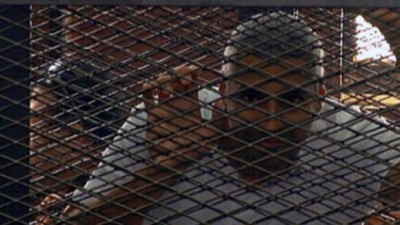 Two Al-Jazeera journalists walked free from an Egyptian prison Friday and were reunited with loved ones after more than a year behind bars on terror-related charges that drew international criticism from human rights and media groups.
Two Al-Jazeera journalists walked free from an Egyptian prison Friday and were reunited with loved ones after more than a year behind bars on terror-related charges that drew international criticism from human rights and media groups.
Mohamed Fahmy and Baher Mohammed are free pending their retrial, scheduled for Feb. 23. A third colleague, Peter Greste, was released two weeks ago and deported to his home country of Australia.
Human rights lawyer Amal Clooney, who represents Fahmy, cautioned that there is no guarantee the case will be closed or that the journalists will be acquitted.
Fahmy holds a Canadian passport, and Clooney urged that he be deported the way Greste was. She asked that the Canadian prime minister “personally intervene” to ensure authorities hand Fahmy over to Canada under a recently approved decree that gives Egypt’s president the right to deport foreigners who are either on trial or have been convicted.
“This case is not over yet, but it should be,” Clooney said.
Mohammed was initially sentenced to 10 years in prison and Fahmy to seven years but Egypt’s top appeals court subsequently ordered a retrial after overturning the initial ruling, citing “flawed evidence.” On Thursday’s first session of the retrial, the judge ordered their release for now.
Fahmy was reunited with his fiancée after his brother posted $33,000 bail Friday.
“Free Sunshine at Cairo Marriott Where it all started with my better half … till death do us part,” Fahmy said in a tweet. He and Greste were arrested at the hotel in a police raid more than a year ago.
Fahmy added in a tweet: “Lots of love to the global journalism community for supporting us. A special ‘Thank you’ to the foreign press family in Egypt.”
Mohammed, who was released without bail, arrived home about 7 a.m., his wife, Jehane Rashed, told The Associated Press. Photos on Facebook and video on Al-Jazeera showed him hugging and playing with his children — one of whom was born during his detention — and wearing clothes with saying “Free Press.”
“I will continue fighting for the freedom of expression, and I will not back off,” he said in the video. He was freed without bail.
Fahmy and Mohammed must still check in with the police every day.
The three journalists, who worked for the Qatar-based Al-Jazeera’s English-language channel, were arrested in December 2013 and accused of being part of a terrorist group and airing falsified footage intended to damage Egyptian national security.
Islamist President Mohammed Morsi was ousted in 2013 by Egypt’s military, and his Muslim Brotherhood was branded a terrorist organization. Qatar was the main backer of the Brotherhood.
Since Morsi’s ouster, Egypt has been cracking down heavily on his supporters, and the journalists were accused of being mouthpieces for the Brotherhood.
Al-Jazeera and the journalists have denied the allegations, saying they were simply reporting the news.
They were convicted by a lower court on terrorism-related charges and sentenced to at least seven years in prison. Human rights groups dismissed the trial as a farce and an attack on media freedom, and the convictions brought heavy international criticism.
The Court of Cassation, the country’s highest appeals court, ordering the retrial, saying the initial proceedings were marred by violations of the defendants’ rights.
Al-Jazeera called the decision to free Fahmy and Mohammed “a small step in the right direction” but said the court should dismiss “this absurd case” and release both unconditionally.
Fahmy could be deported like Greste, but Baher, who holds only Egyptian citizenship, faces an unclear future.
Cairo has signaled it wants to resolve the case and end the criticism ahead of a major economic conference next month to drum up international investment. Egypt’s staggered parliamentary elections are also due to start in March.
Though el-Sissi had rejected calls from the United States and other Western governments to pardon or commute the sentences, he acknowledged in July that the heavy sentences had a “very negative” impact on Egypt’s reputation and that he wished they had never been put on trial.
Canadian Prime Minister Stephen Harper said Thursday that his government was in touch with officials in Egypt “at all levels, including on my level,” and was continuing to press for Fahmy’s freedom.
“We do remain optimistic that this case will be resolved,” Harper said.
Eleven other defendants in the case — mostly students accused of being Brotherhood members — were also ordered released without bail.